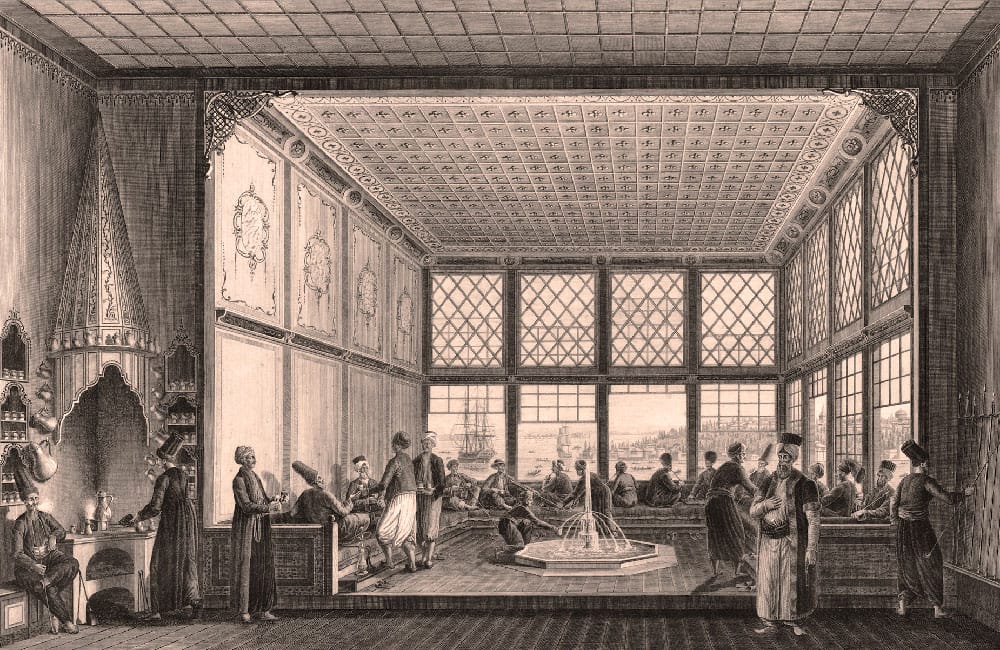Origen del café, historia y leyenda con más de 2.500 años
La piedra filosofal, el Opus magnum de los alquimistas, la sustancia legendaria que todos buscaban, capaz de convertir el plomo en oro o de conseguir el elixir de la vida y entregar la eterna juventud a quien lo obtuviera es una leyenda con una base mística.
La historia del origen del café comparte similitudes con ésta, puesto que muchas de las leyendas atribuyen el descubrimiento del café a místicos musulmanes que seguían el camino del sufismo.
Y, como la piedra filosofal, el café otorga la juventud a quien lo toma, aunque sea solo por un breve periodo de tiempo: aquel en el que el compuesto químico activo del café, la cafeína, actúa estimulando el sistema nervioso central.
Pero no por tener un atisbo legendario la historia del origen café no deja de ser menos apasionante, porque no hay leyenda cuya base no esté en la realidad histórica.
La primera mención escrita del café

Mapa antiguo en el que aparece Abisinia y Yemen, posible origen del café
Es muy probable que el cultivo del café comenzará en el valle de Harar, en Abisinia (la actual Etiopía y Eritrea), alrededor del 575 AD. Los habitantes de este lugar consumían las bayas de café mezcladas con grasas animales como alimento energizante.
Pero la primera mención escrita que encontramos es de un erudito, médico, filósofo e historiador persa, Ar-Razi, del siglo X. Además de hablar del café, a este erudito se le atribuyen el descubrimiento del ácido sulfúrico, el etanol y grandes aportes a la medicina y la filosofía.
La historia más antigua, aunque sin base histórica y sin haber sido aceptada por los eruditos musulmanes que se han encargado de verificar las transmisiones sobre la vida del Profeta Muhammad, el origen del café se explica porque le fue entregado a este Profeta por el Arcángel Gabriel como una bebida “tan negra como la Kaaba de Meca” y “que otorga fuerza suficiente para derribar a cuarenta hombres de su caballo”.
Aunque esta leyenda sea probablemente falsa, nos da una pista sobre el origen del café: para el siglo X ya era una bebida conocida en el mundo árabe.
La leyenda de Kaldi el pastor

Plantación de café en Yemen
Una de las más conocidas leyendas sobre el origen del café es la del pastor Kaldi, quien atendía a sus cabras en unas colinas de Abisinia a orillas del Mar Rojo y cerca de un monasterio.
Kaldi observó que sus cabras comían de un arbusto con bayas rojas y que, una vez ingeridas las bayas, empezaban a brincar con excitación. Contó esto a uno de los monjes quien fue con él, observó el comportamiento de las cabras y recogió algunas de estas bayas.
El monje probó varias formas de consumir las bayas, hasta que dio con la receta: tostó y molió las semillas y con ellas realizó una extracción con agua cuya forma perdura hasta hoy.
Como resultado de esta cocción los monjes se mantenían más alertas durante las noches de vigilia haciendo sus rezos.
Esto nos aporta otra pista: el lugar donde los botánicos han trazado el origen del café es Etiopía. De esta, poco después, pasó al Yemen.
La historia del erudito y médico Ali bin Umar

Hombre del Yemen frente a una plantación de café
Otra de las leyendas sobre el origen del café se le atribuye a un místico, erudito y médico, Ali bin Umar, del Yemen.
Este erudito y médico fue desterrado de Tarim a las montañas del Yemen por una falsa acusación. En las montañas descubrió una planta de flores blancas y bayas rojas.
Ali bin Umar observó el comportamiento de los animales tras comer esta planta -se excitaban y encabritaban- y tras un tiempo y ver que nos les perjudicaba, decidió hacer una cocción con ella.
Tras varios experimentos llegó a la cocción que hoy conocemos como café, hecha con las semillas. Le gustaron tanto su sabor como sus efectos que poco después emprendió la peregrinación a La Meca y llevó con él semillas de esta planta.
Una vez en La Meca se encontró con una epidemia y utilizó el café junto con otras plantas para curar a los enfermos.
Como agradecimiento por sus servicios fue perdonado y pudo volver a Tarim y esta bebida se popularizó en todo el Yemen.
El probable viaje del café

Grupo de hombres yemenís tomando café
De esta leyenda obtenemos más pistas para trazar el viaje del café. La planta del café es originaria de Etiopía, donde probablemente se consumía como alimento, pero no como bebida. De Etiopía saltó a Yemen llegando primero al puerto de Mocha y de ahí se extendió por toda la Península Arábica.
La manera en la que se extendió fue ya en forma de bebida, por lo que podemos decir que la actual bebida del café se origina en Yemen, aunque la planta fuese autóctona de Etiopía.
Y la forma en la que se extendió por toda la Península Arábica, y más tarde por todo el mundo musulmán primero y luego a occidente, sigue otra leyenda.
Disfruta del café de temporada, visita nuestra tienda
La bebida de los sufíes

Grupo de sufíes de la Tariqa Mevlevi en Turquía
Se dice que fue un Shaij (maestro) de una Tariqa (camino espiritual) sufí quién ofrecía esta bebida a sus discípulos para que se mantuvieran despiertos durante las largas noches de Dhikr (invocaciones recordando a Dios).
Este maestro era Abu Hasan Al-Shadili, un conocido erudito marroquí del siglo XIII. Este observó a unos pájaros que tenían mucha vitalidad tras comer unas bayas mientras viajaba por Etiopía.
Tras probar estas bayas sintió la misma vitalidad y se las dio a sus discípulos, entre quienes estaba un tal Umar que luego las llevó a Yemen (y probablemente fuese el mismo Umar bin Ali que curó la epidemia en La Meca).
Esta bebida se hizo popular entre los musulmanes sufíes como un estimulante para el trabajo espiritual y fueron ellos quienes lo extendieron por todo el mundo musulmán a través de sus reuniones.
Una vez más, vemos que la leyenda del origen del café, nos cuenta parte de la verdad: que la bebida del café se extendió de Yemen a la Península Arábica y de ahí al mundo musulmán primero y luego a Occidente.
Equípate con nuestros complementos, visita nuestra tienda
Controversia sobre el café en el mundo musulmán

Foto antigua de una cafetería del Cairo
Pero el café no siempre gozó de buena reputación entre todos los musulmanes.
Una traducción de un manuscrito de Al-Jaziri, rastrea la propagación del café desde Arabia Felix (actual Yemen) hacia el norte hasta La Meca y Medina. De ahí, y siguiendo una o varias de las historias que hemos comentado previamente, se extendió a las ciudades más grandes de El Cairo, Damasco, Bagdad y Constantinopla.
Asociados al sufismo, se establecieron muchos lugares donde se consumía café en El Cairo, alrededor de la Universidad de Al-Azhar. Estos cafés también se abrieron en Siria, especialmente en la ciudad de Alepo, y luego en Estambul, la capital del Imperio Otomano, en 1554.
Pero todos sabemos que el café es un potente estimulante, y que cuando causa efecto hace que la gente hable, y que cuando la gente habla, piensa y se entiende. Y esto no siempre es bueno para los gobernantes.
Prohibición del café

Antigua cafetería en Estambul durante el Imperio Otomano
El café fue prohibido por algunos imames en La Meca en 1511, bajo la justificación de que era un intoxicante como el alcohol, aunque de efecto más leve.
Como bien sabemos, la religión se utiliza muchas veces para justificar las necesidades políticas, y puede que esto fuera una de esas veces. La razón parece ser que en estos cafés los adversarios políticos de la autoridad del momento se reunían a hablar de política y otros temas de descontento social del momento, creando inestabilidad y cociendo a fuego lento revueltas futuras y presentes.
El café y los lugares donde se consumía también fueron proscritos en El Cairo en 1532, algo que no hace sino apoyar esta hipótesis de que no era tanto una cuestión religiosa sino política.
Los Otomanos rechazaron el juicio de que el café fuese una bebida no permisible para los musulmanes en 1524 por orden del Sultán Suleimán I y el Gran Mufti Mehmet Ebussuud el-İmadi.
La llegada del café a Occidente

Ilustración de la antigua Venecia
Los que nos indica esta prohibición en 1511 y su posterior revocación es que el café era una bebida muy popular en todo el mundo musulmán. Tanto como para merecer la atención de eruditos, místicos y sultanes.
Si antes de la prohibición del café este ya era muy popular, una vez que se revocó esta los lugares para tomar café se multiplicaron. Tan popular se hizo, que alrededor del siglo XVI y como medida para controlar el mercado de café, quedó prohibido exportar semillas de café que pudiesen germinar fuera de las fronteras del Imperio Otomano.
Otra leyenda dice que fue Baba Budan, un peregrino musulmán de India que fue a La Meca, quien se llevo escondidas siete semillas de vuelta a su país alrededor de 1600; y que fue en Mysore -el lugar de origen de este peregrino- donde se cultivó café fuera de la Península Arábiga y Etiopía por primera vez.
En 1615 mercaderes venecianos llevaron café desde Mocha a Europa, lo que comenzó un lucrativo negocio para los árabes quienes guardaron con aún más celo esta preciosa semilla.
Pero una vez el café ya estaba fuera y siendo un negocio tan lucrativo, solo era cuestión de tiempo que se estableciera la costumbre de tomar café en Occidente y que se extendiera su cultivo alrededor de grandes áreas tropicales del planeta.
Pero esa ya, es otra historia...
Bibliografía sobre el origen del café
Bennett Alan Weinberg, Bonnie K. Bealer. “The World of Caffeine: The Science and Culture of the World's Most Popular Drug”. Routledge, 2004
“Café” en Wikipedia: https://es.wikipedia.org/wiki/Caf%C3%A9 Accedido el 2 de Marzo de 2022
F. Smith, Reginald. “A History of Coffee”. En Coffee: Botany, Biochemistry and Production of Beans and Beverage. Croom Helm, 1985
Jeanette M. Fregulia. “A Rich and Tantalizing Brew: A History of How Coffee Connected the World”. University of Arkansas Press, 4 mar 2019.
Myhrvold, Nathan. "Coffee". Encyclopedia Britannica, 19 Feb. 2022,https://www.britannica.com/topic/coffee Accedido el 2 de Marzo de 2022









